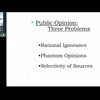deliberations

James Fishkin: Is Deliberation an Antidote to Extreme Partisan Polarization?
James Fishkin: Is Deliberation an Antidote to Extreme Partisan Polarization? Reflections on “America in One Room” This talk is positioned at the intersectionof two literatures: partisan polarizatio
James Fishkin: Is Deliberation an Antidote to Extreme Partisan Polarization? Reflections on “America in One Room”
AbstractIs Deliberation an Antidote to Extreme Partisan Polarization? Reflections on “America in One Room” Register here to join the seminar This talk is positioned at the intersectionof two literatures
POSTPONED. NEW DATE PENDING. James Fishkin: Democracy When the People Are Thinking: Applications of Deliberative Democracy
Postponed. New date pending. James Fishkin, Professor of Communication, Professor of Political Science (by courtesy) and Director of the Center for Deliberative Democracy, Stanford University. Abstract D

Lambros Roumbanis
My research focuses on the organization of expert judgments, evaluation technologies, selection mechanisms, and complex decision-making processes. More specifically, I study how organizations deal wit
Should Extinction Be Forever?
Should Extinction Be Forever?, Philosophy and Technology, First online: 17 october 2015 This article will explore a problem which is related to our moral obligations towards species. Although the re-cr, (6128), 32–33, ). This article will provide an argument in favour of re-creation based on normative considerations. The environmentalist community generally accepts that it is wrong to exterminate species, for reasons beyond any instrumental value these species may have. It is often also claimed that humanity has a collective responsibility to either preserve or at least to not exterminate species. These two beliefs are here assumed to be correct. The argument presented here departs from and places these two ideas in a deontological framework, from which it is argued that when humanity causes the extinction of a species, this is a moral transgression, entailing a residual obligation. Such an obligation implies a positive duty to mitigate any harm caused by our moral failure. In light of recent scientific progress in the field of genetic engineering, it will be argued that humanity has a prima facie obligation to re-create species whose extinction mankind may have caused, also known as de-extinction.
Larry Temkin: Equality as Comparative Fairness
Larry Temkin, Distinguished Professor of Philosophy at Rutgers School of Arts and Sciences. The State University of New Jersey. ABSTRACT The goal of this talk is modest. It is simply to help illuminate
Karsten Klint Jensen: Future Generations in Democracy
Karsten Klint Jensen, Associate Professor, Department of Food and Resource Economics (IFRO), University of Copenhagen. ABSTRACTIn this talk I ask whether the genuine representation of future generation
Human Enhancement and Technological Uncertainty. Essays on the Promise and Peril of Emerging Technology
Doctoral thesis. KTH Royal Institute of Technology.ISBN 978-91 7595-341-0 Abstract Essay I explores brain machine interface (BMI) technologies. These make direct connection between the brain and a machi
Social choice, nondeterminacy and public reasoning
Res Philosophica 98 ABSTRACT This article presents an approach to how to make reasonable social choices when independent criteria (e.g., prioritarianism, religious freedom) fail to fully determine what t
Nancy Cartwright: Understanding and misunderstanding randomized controlled trials
Nancy Cartwright is Professor of Philosophy at the Department of Philosophy, University of Durham and at the University of California, San Diego ABSTRACTRCTs are valuable tools whose use is spreading i








